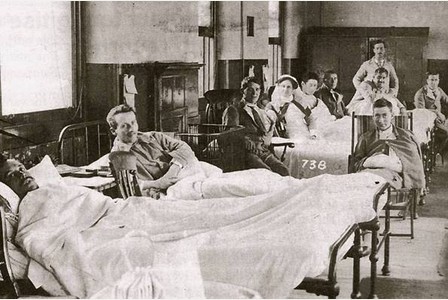Bombs were falling on Queen Alexandra’s Hospital, but Matron Helena Kate Repton forced herself to remain calm. She continued assisting surgeons performing operations, tending to the wounded, and giving words of instruction and encouragement to the other nurses.
Queen Alexandra’s Hospital was based in Dunkirk, one of the most dangerous areas of the Western Front.
Doctors and nurses didn’t last long with a nervous disposition. Matron Repton was a senior nurse in charge of organizing the rest of the staff – keeping them calm and able to continue working under pressure, even through bombing raids.
So often was the hospital bombed, it had its own bomb shelters. If the shelling got bad enough, some of the patients and staff could take shelter there. The worst of the wounded, though, could not leave their beds even during the worst bombings, and neither could the nurses by their sides. The nurses sat and held the hands of the soldiers.
Matron Repton would force herself to ignore the sounds of the bombs as she worked. Even when the bombs were not falling the hospital was filled with the cries and groans of the dying and wounded. The staff were overworked, exhausted, and continually terrified by the falling bombs.
When the bombs weren’t falling, the work continued. There was no time for breaks, and the stream of wounded from the front never stopped. While she slept, others would continue tending to the wounded until they could be relieved at the end of their shift.
Matron Repton’s bravery was not unrecognized, and it was not unrewarded. She was one of only 146 women to receive the Military Medal during World War I.
Helena Kate Repton was the daughter of Thomas and Sarah Repton. She was born on January 2nd, 1872. By 1891, she was living with her parents and with her brothers, Frederick and Charles, and her sister Mary, at 45 High Lane, Burslem. She was 19 and working as a draper’s assistant.
She trained as a nurse at Leeds General Infirmary and later became a night sister at Plymouth and then at St. Bartholomew’s Hospital in Rochester and at Plaistow. By 1901, she was living with other nurses in Moorgate Grove in Rotherham. She was very capable as a nurse, and by 1907 she was employed as Assistant Matron at Haine Isolation Hospital.
When the war began in 1914, she joined the Friends’ Ambulance Unit – a volunteer ambulance service founded by the Quakers. She knew that she would be of better use in France with the British Red Cross, where she could help the soldiers carried out of the trenches.
She arrived in France on April 27th, 1915, and headed to Dunkirk. After a few weeks, she took charge of St. Alexandra Hospital – one of the FAU’s largest projects during the war. The hospital had originally been set up to deal with the typhoid epidemic of 1914 and 1915 and was officially attached to the French 8th Army. By the time she arrived, arrangements had been made to admit British patients.
Queen Alexandra Hospital was often shelled during the war. During September 1917 they were attacked almost daily by enemy artillery, bombing runs, and guns on board battleships. In 1918, the hospital was moved to the Chateau de Petite Synthe, about a mile and a half from Dunkirk, where it was safer.
In June of 1918, Matron Repton returned home on leave and was presented with the Military Medal and the Royal Red Cross (second Class) by King George V. In August of 1918, His Majesty made a surprise visit to the hospital to meet the staff.
Matron Repton was also awarded the French Medal of Honour, Ministry of War, 3rd class (Epidemics) in bronze for “constant proof of the greatest zeal and devotion to her care of the sick and contagious cases” for her work during the typhoid epidemic of 1915. She was also awarded the French Long Service Decoration, and since she served in France from April of 1915, she was awarded the 1914-1915 Star and British War and Victory medals.
Matron Repton stayed with the British Red Cross until January 25th, 1919, helping the wounded even after the signing of the Armistice on November 11th, 1918. She returned to the Haine Hospital, becoming matron in 1922.
She retired from Haine Hospital in 1939. Months later, she volunteered to return to service when World War II broke out. She was made matron of Biggleswade Isolation Hospital. She died suddenly in June 1941 at the age of 61 while out shopping. She is buried in St. Bartholomew’s churchyard in Norton-in-the-Moors where she was baptized.
